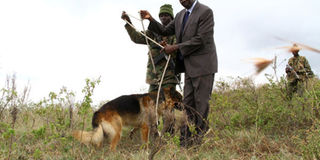KWS declares all-out war against poachers

KWS Director William Kiprono launches a manhunt for two suspected poachers at the Nakuru National Park on March 18, 2014. Photo/Suleiman Mbatiah
What you need to know:
- Sh600 million set aside to hire rangers and buy equipment, says agency boss
- Man shot dead in Lake Nakuru National Park as police search for two accomplices
An all-out war has been declared on poachers to protect wild animals.
Intelligence gathering had been enhanced within and outside wildlife sanctuaries, with the government committing Sh300 million for the recruitment of rangers this financial year, Kenya Wildlife Services director William Kiprono said on Tuesday.
Mr Kiprono said that a similar amount had been set aside to buy essential equipment to enhance the agency’s ability to fight poaching.
He was speaking at Lake Nakuru National Park where a suspected poacher was shot dead by rangers on Monday night.
The poacher was one of three who had entered the park to hunt for rhinos.
Poaching at the park has become rampant, with at least four rhinos killed in the last two months. Of the four rhinos only a pair of horns was taken. The other three had their horns intact.
Mr Kiprono said Kenya earned more than Sh70 billion from tourism last year and called on all Kenyans to join in the anti-poaching war.
The director said an elephant DNA databank and laboratory were nearly complete.
This, he said, would help nail culprits in court, with new wildlife laws handing life terms and hefty fines to those found to have killed an endangered species.
Assured tourists
“I have just arrived from Berlin where we assured tourists that Kenya has over 25,000 animal species and 7,000 different species of plants. We have adequate security and tourists should come and enjoy Kenyans’ hospitality,” he said.
The KWS boss commended the rangers who shot down the poacher and recovered four arrows and a spear laced with poison.
Mr Kiprono said poachers had become sophisticated, with their focus now turned to rhinos. He said 120 rhinos were killed last year, compared to 59 in 2012.
Poaching is driven by the growing demand for rhino horns in the Asian markets.





